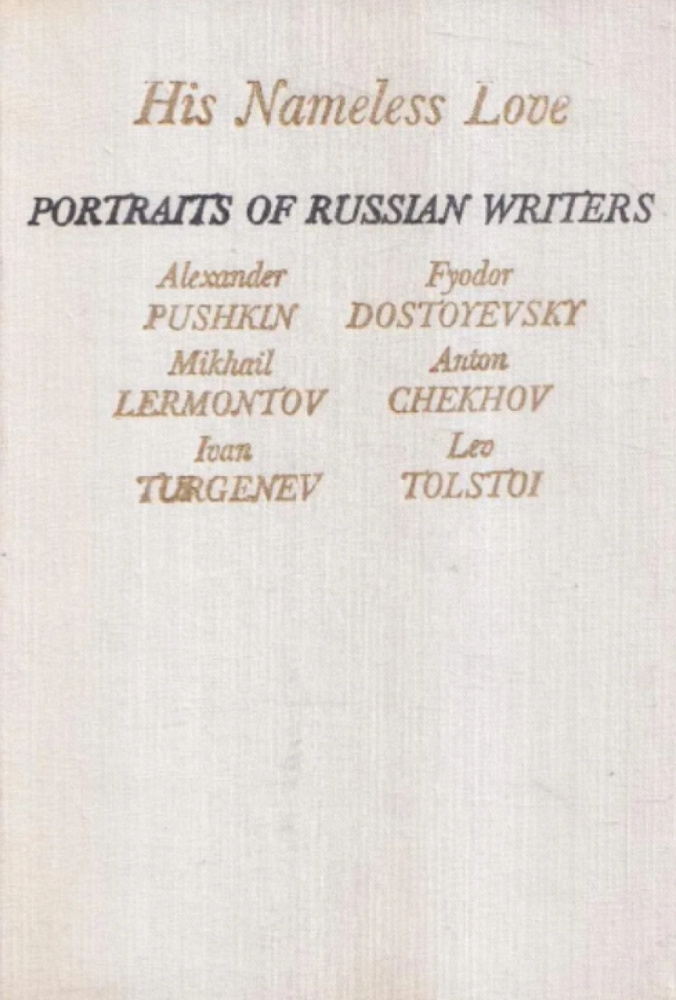- Книги
- Букинистика
- Художественная литература

−37%
His Nameless Love. Portraits of Russian Writers. Безыменная любовь. Повести о жизни русских писателей (на английском языке)
Тип книги:
О товаре
Перейти к описанию
О книге
"My belief is that the difference between fiction and history is not that the former is 'invented' but rather that it brings us a deeper and more subtle understanding of people and events, through its
23,49 BYN 37,73 BYN
Часто задаваемые вопросы
Описание
"My belief is that the difference between fiction and history is not that the former is 'invented' but rather that it brings us a deeper and more subtle understanding of people and events, through its closer, more intense preoccupation with them. A writer can never invent anything more beautiful and powerful than the truth," said Yuri Tynyanov (1894-1943), a scholar and writer who combined in his work meticulous historical research and sensitive psychological analysis.
Three of Tynyanov's best-known works are his historical novels Küchlya (1925) about the Decembrist poet Wilhelm Küchelbecker, The Death of Vazir-Mukhtar (1927-1928) about Alexander Griboyedov, a diplomat and the author of the famous comedy Wit Works Woe, and Pushkin (1935-1943), which the writer did not live to finish. From Tynyanov's pen also stem the historical stories Sublieutenant Kizhe, Wax Personage and a number of film scripts.
Tynyanov possessed a rare sense of history. When available material was insufficient to provide a full picture, he could make use of the most insignificant data, what one might term the shadows of an action, thought or feeling, to capture what was of major, fundamental importance and build up his narrative upon them.
One such shadow" in the history of literature was Pushkin's "nameless love", a love for a woman whose name he never disclosed, which lasted throughout his life and exerted a profound influence on it.
Many a scholar attempted to fathom out the name of the woman Pushkin loved so hopelessly for so long. Princess Golitsina, Maria Rayevskaya and others were mentioned. Tynyanov, after a thorough study of Pushkin's elegies of the Lyceum period, came to the conclusion that the woman in question was Ekaterina Karamzina, the wife of the famous historian Nikolai Karamzin. He also put forward the hypothesis that it was to Ekaterina Karamzina that the dedication of the poem Poltava was addressed and that The Fountain of Bakhchisarai was also connected with memories of her and the story she had told Pushkin. If we accept this explanation, the fact that an hour before his death Pushkin asked to see Ekaterina Karamzina falls into place. This literary exploration bore fruit in the shape of the story included in this volume about the “hidden" love that Pushkin cherished from schooldays to his deathbed.
Three of Tynyanov's best-known works are his historical novels Küchlya (1925) about the Decembrist poet Wilhelm Küchelbecker, The Death of Vazir-Mukhtar (1927-1928) about Alexander Griboyedov, a diplomat and the author of the famous comedy Wit Works Woe, and Pushkin (1935-1943), which the writer did not live to finish. From Tynyanov's pen also stem the historical stories Sublieutenant Kizhe, Wax Personage and a number of film scripts.
Tynyanov possessed a rare sense of history. When available material was insufficient to provide a full picture, he could make use of the most insignificant data, what one might term the shadows of an action, thought or feeling, to capture what was of major, fundamental importance and build up his narrative upon them.
One such shadow" in the history of literature was Pushkin's "nameless love", a love for a woman whose name he never disclosed, which lasted throughout his life and exerted a profound influence on it.
Many a scholar attempted to fathom out the name of the woman Pushkin loved so hopelessly for so long. Princess Golitsina, Maria Rayevskaya and others were mentioned. Tynyanov, after a thorough study of Pushkin's elegies of the Lyceum period, came to the conclusion that the woman in question was Ekaterina Karamzina, the wife of the famous historian Nikolai Karamzin. He also put forward the hypothesis that it was to Ekaterina Karamzina that the dedication of the poem Poltava was addressed and that The Fountain of Bakhchisarai was also connected with memories of her and the story she had told Pushkin. If we accept this explanation, the fact that an hour before his death Pushkin asked to see Ekaterina Karamzina falls into place. This literary exploration bore fruit in the shape of the story included in this volume about the “hidden" love that Pushkin cherished from schooldays to his deathbed.
Информация о технических характеристиках, комплекте поставки, стране изготовления, внешнем виде и цвете товара носит справочный характер и основывается на последних доступных к моменту публикации сведениях
Подборки товаров в категории Букинистика: Художественная литература
Отзывы о товаре
0
His Nameless Love. Portraits of Russian Writers. Безыменная любовь. Повести о жизни русских писателей (на английском языке)
Нет оценок
Вопросы и ответы 0
Как правильно задавать вопросы?
Будьте вежливы и спрашивайте о товаре, на карточке которого вы находитесь
Если вы обнаружили ошибку в описанием товара, воспользуйтесь функцией
Как отвечать на вопросы?
Отвечать на вопросы могут клиенты, купившие товар, и официальные представители.
Выбрать «Лучший ответ» может только автор вопроса, если именно этот ответ ему помог.



